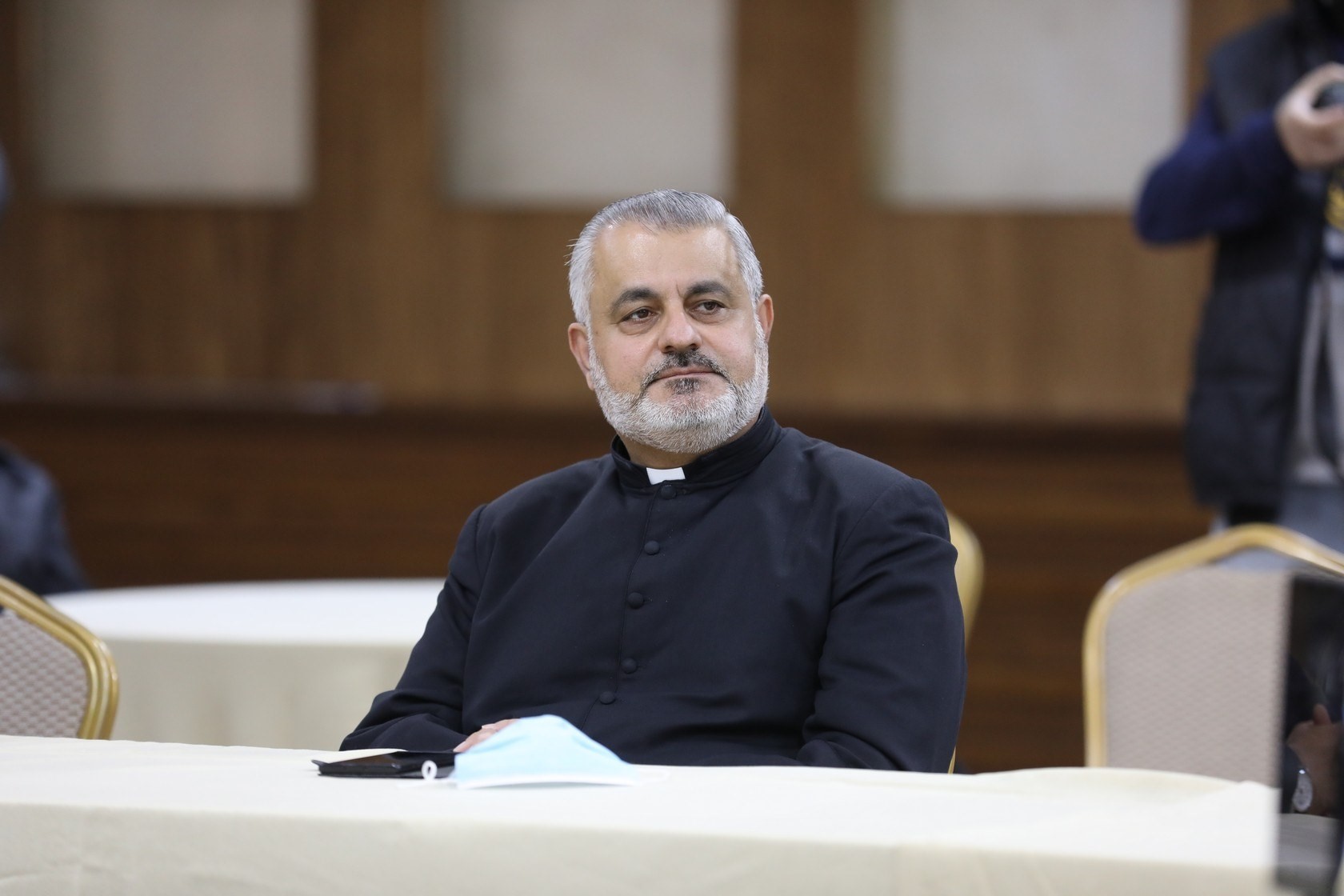
Father Rifat Bader is an expert in relations between the Catholic Church and the Arab region, as well as a founding member of the KAICIID-supported Platform for Dialogue and Cooperation in the Arab World. He acted as a spokesperson in three papal visits to Jordan and spoke with KAICIID about Pope Francis’ historical visit to Iraq.
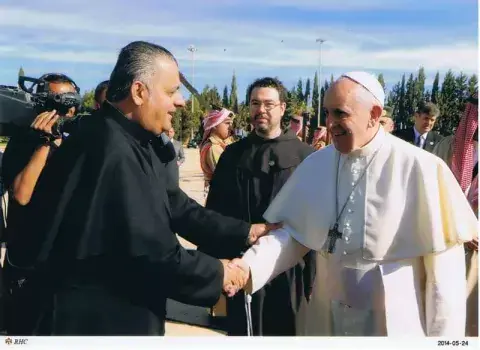
Pope Francis’ visit to Iraq was particularly meaningful for the celebration of religious pluralism in the country. What was the message it sent to religious minorities who have endured violence and oppression?
Respect for religious pluralism is among Iraq’s main issues and the importance of this visit was crucial in terms of mutual relations between believers of different faiths. This includes, of course, Muslims and Christians but also Baha’i, Mandaeans and several more. We used to refer to Christians and Muslims as partners of civilisations but here – and thanks God for a short time - they ended up being against one another. This happened because militants of terrorist groups wanted to destroy the image of Iraq. Pope Francis came after that damage, that deconstruction of the country, now that everything is ready for the start of a new era, where respect between different faiths is crucial. Religious freedom is the core of all freedoms, there can be no democracy without it. In this sense, the meeting of religions in Ur was a fresh start, a new sunrise for good relations between religions, a mission accomplished by Pope Francis but also a message sent from Iraq to the whole world: losing components of religious pluralism is like losing stones of a mosaic. When Christians fled Mosul and the Nineveh Plains, their Muslim co-citizens also lost an important part of the society they lived in.
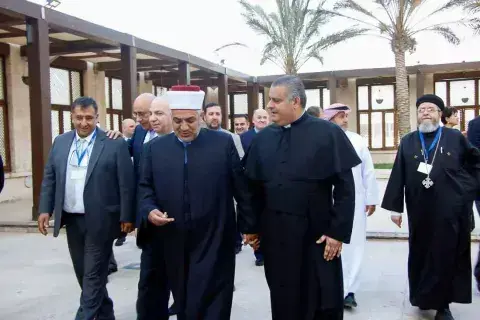
What was the importance of this visit for the entire Middle East region and for interreligious dialogue at a global level?
A papal visit is never only about the local community. It concerns the universal Church, the whole world, the entire humanity. Around 70 media representatives from across the world came to Iraq on the Pope’s flight. They didn’t only cover the two press conferences, upon arrival and before his departure, but also the Pope’s meetings and speeches directed at the entire world, emphasising the importance of religious pluralism and the presence of Christians in the country. Meetings like the one the Pope held with Ayatollah Al Sistani, for instance, did not only concern the Iraqi community but also relations between religions in the entire world, where Shiite Muslims are a community of about 300 millions. It was also a meaningful event for relations between Sunnites and Shiites, which are not always peaceful. Meetings like this one will have an impact on the entire Middle East region, where religion has been used by terrorists to justify violence. When religious leaders meet, like they did in Ur and Al Sistani’s home, they send an important message to the whole world: no more killings in the name of God. Religion is peace and the name of God must only be used for peaceful purposes.
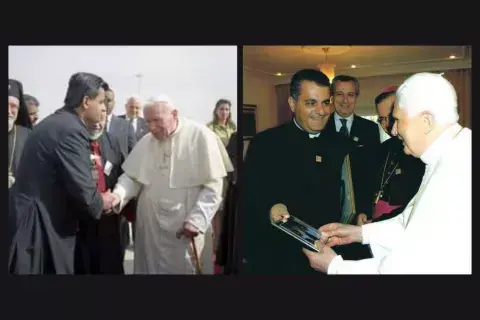
You acted as a spokesperson during three papal visits to Jordan. Did the message delivered by these visits change through the years and in what way is Pope Francis’ visit to Iraq different from his predecessors’ and his own visit to Jordan?
John Paul II came to Jordan in the year 2000, before Benedict XVI in 2009 and Pope Francis in 2014. He was dreaming of visiting Iraq as part of the same trip but an international embargo had been imposed on the country and, out of respect for the United Nations, he did not go. What he did, instead, was a virtual pilgrimage. He received a video of Ur and prayed as if he was there. It’s interesting how now, under a pandemic, when everything is virtual, Pope Francis managed to come to Iraq in person. With his visit, both his dream and that of John Paul II came true. Pope Francis’ visit to Iraq is different from papal visits to the Holy Land because it’s about the martyrs of the 21st century. When he prayed in the Church of our Lady of Salvation in Baghdad, the Pope could smell the blood of those who were killed in their Sunday mass in 2010. When he went to Mosul he prayed among the ruins of the destroyed churches. Pope Francis came to Iraq in order to restore Iraqi people’s trust in each other, in their country and in the future. His visit was also a call for those who left the country to come back and contribute to the creation of a new Iraq.
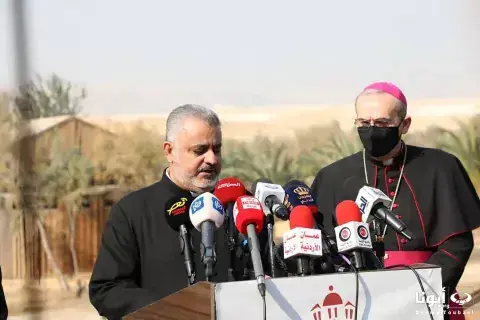
You are an expert in relations between religion and the media. What role do media play, or could play, in promoting interreligious dialogue and peace?
The late “Islamic State’s” leader Al Baghdadi once praised media for helping his ideas reach young people across the world. Media have a huge strength which can be used in a negative way. This is why I was not surprised to see how many young people from Jordan and other places in the Middle East joined ISIS after following it on its social media accounts. Media, though, can also help restore love, beauty and collaboration between people. What we have to do now is promoting human dignity and the ‘Culture of Encounter” through media and opposing violence and the destruction of societies.
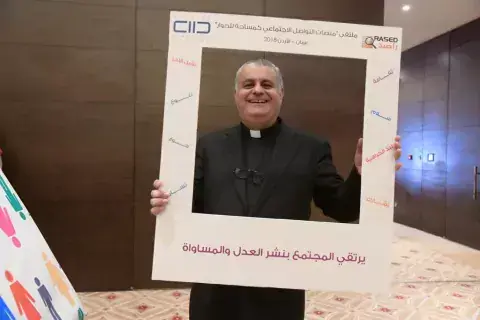
You are also among the founding members of the KAICIID- supported Platform for Dialogue and Cooperation (IPDC) in the Arab World. What is the role of this platform and what goals has it achieved so far?
When we talk about the IPDC we are talking about gathering religious leaders and institutions from the entire Arab region. It wasn’t easy to come up with a way to do that, because religion hasn’t always been about coming together. Sometimes we perceive differences as reasons for disputes or for being against others rather than besides each other. When the establishment of this platform was officially announced in Vienna in February 2018 this was really a dream come true. One of IPDC’s executive members, Mesrur Muhialdeen, took part in the meeting with the Pope in Ur, which makes me very happy because it proves that we are present in interreligious events and playing our role despite all the difficulties we may encounter in the Middle East. We need to keep encouraging initiatives which gather people together and emphasise the role of religion as a means for peace. We have, as individuals and religions, to adopt the prayer of Saint Francis from the 12th century: “O Lord, make me an instrument of your peace”.
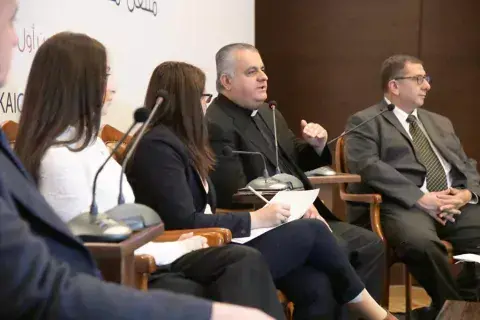
The last day of the Pope’s visit to Iraq coincided with International Women’s Day. In Iraq women from religious minorities, and not only, have suffered greatly. Many of them have been victims of the most horrifying forms of violence. What is the role they will play now in peacebuilding?
In Qaraqosh, the Pope expressed his heartfelt gratitude to all the mothers and all the women of Iraq in general, describing them as women of courage who continue to give life despite the wrongs they have suffered and the wounds they were inflicted. He said: “women have to be respected, protected and provided with opportunities”. He had listened to the testimony of a woman who suffered greatly but said she came back, ready to forgive. The Pope said forgiveness is key for the future of Iraq, but opportunities for women also are, so that they can re-establish their active presence in the new Iraqi society, which will be built on justice, equality and forgiveness.
He is a Founding Member of the KAICIID-supported Interreligious Platform for Dialogue and Cooperation in the Arab World and an expert on Vatican relations in the region. He became a priest in the Latin Patriarchate in 1995, and worked as an official press spokesperson for three papal visits to Jordan: Pope John Paul II (2000), Pope Benedict XVI (2009) and Pope Francis (2014).
In 2003, he founded abouna.org and continues to be its Editor-in-Chief, operating with the slogan ‘Media for Humans’. He is also the Founder and Director of the Catholic Centre for Studies and Media since 2012. He authored several books and writes for a number of daily and weekly Jordanian, Arab and foreign newspapers. He has participated in many lectures, television interviews and international conferences. He is fluent in Arabic, English, French and Italian and is active in the field of social media. He has organized many workshops to train young university students on "the good use of communication means, for rapprochement and dialogue."